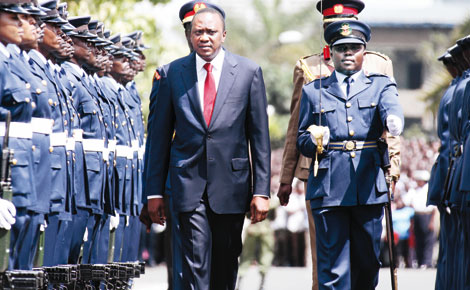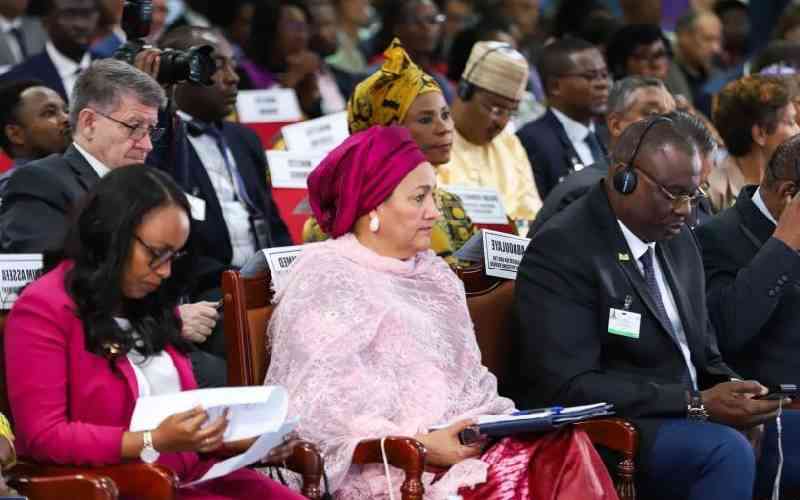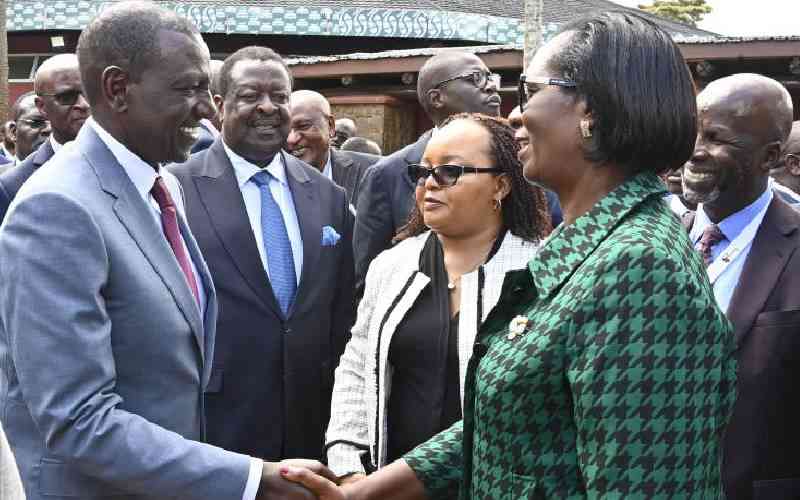 |
|
President Uhuru Kenyatta inspects a guard of honour before addressing both Houses of Parliament Thursday. [Photo: Mbugua Kibera/ Standard] |
By Geoffrey Mosoku
Nairobi, Kenya: President Uhuru Kenyatta’s inaugural State-of-the-Nation address gave a glimpse of the headache he faces in trying to mobilise resources to meet huge expectations of the nation.
Coming 13 days to marking his first year in office, Thursday’s address was more like a report about work in progress, with President Kenyatta defending some policies that had attracted public backlash like the VAT law.
The address to the special sitting of Parliament is enshrined in the Constitution for the Head of State to report on progress in achieving national values and fulfillment of international obligations.
But even then, the President’s speech sparked mixed reviews, especially over apparent omissions like the Government’s legislative agenda.
President Uhuru’s unwavering defence of the VAT Act, in spite of the criticism it has attracted, exemplified the fact that the Jubilee Government is keen to mobilise every coin.
The VAT Act, which narrowed the list of goods including basic commodities that were exempt from tax, caused a storm and an Amendment Bill is pending in the House.
He outlined planned massive projects in energy, roads and rail, agriculture, security, among others, to justify the need for more money.
After a year in office, the President was at pains to outline his government’s success on the economic front that would define his presidency. In his first State of the Nation address, he acknowledged difficulties in matching revenue collection with the high Government expenditure, huge debt and high public expectations.
Before ascending to power he had promised that his leadership would put in place policies geared towards economic reconstruction, create thousands of jobs and enhance the country’s infrastructure.
One year down the line, many of these promises are still in the pipeline, while opinion is divided on whether the Jubilee Government is leading the country to the Promised Land and in particular regarding to the economy. The common man is still struggling with the ever-increasing cost of living, insecurity and joblessness.
The promises
But these promises still featured strongly in his address Thursday.
Uhuru said his administration believes in the need to build national capacity to fund development programmes, and the country can only be prosperous and free only if a fitting foundation is laid.
Signaling the Government will press on with the law, and in apparent disapproval of the proposed amendment, the president maintained the measures to raise additional revenue are beneficial in the long run.
Stay informed. Subscribe to our newsletter
“It is for this reason that we expanded our coverage of VAT. I am aware that this may have been perceived as increasing the cost of living and hurting the poor. I want to confirm that although this may be felt as a temporary and painful jab, in the long run, it is for the wellbeing of the country,” he said.
The depth of national foundations must bear the weight of our hopes, the Head of State said, adding that the first year of his administration has been devoted to that task.
“It would have been willful imprudence to do otherwise.”
He said the Jubilee administration would increase funding to the security sector at a time the country is waging war on terror.
The President blamed the past regime for inadequate funding and resources for national security.
“But we would all do well to remember that national governments are continuing institutions. Some of the difficulties we see are the direct consequence of the under-investment of the past three decades. Contrary to perception, this problem is not a new one, but historical. It is not our creation, but it is our duty to confront it,” he added.
Uhuru pledged to hire more police officers to substantially increase police numbers, which he said have already significantly progressed from one police officer for 750 citizens to 1:535, without forgetting their welfare.
President Kenyatta said the Government would allocate resources adequate to the needs of security agencies to enable them meet current and emerging threats to our safety.
“Ground has been broken on a new police housing scheme at Ruai in Nairobi; this will soon be replicated across all 47 counties. An insurance scheme for our men and women in uniform will be established by July this year,” he said.
Discard old habits
The President said the recently launched security initiatives, among them Nyumba Kumi and installation of CCTV cameras along major streets, would help improve security.
On terror threats, the President said the Government had stepped up measures to secure the country without “threatening the bonds of brotherhood that hold between our different faiths.”
On devolution, he said the new system had placed a huge cost burden on the country, but insisted that his administration would devote enough resources for it.
“While the Constitution allows the county-level governments a minimum of 15 per cent of the total national tax revenue, we chose to allocate them more than double the requirement, at 32 per cent” he said.
While the Constitution allowed the process of transfer of powers to counties to proceed over three years, he explained, the Jubilee Government had already completed the process.
“As a sign of my government’s commitment to devolution, we have passed on nearly all the county functions, and the resources to support them,” he said.
The President warned those tasked with leadership not to betray the trust and aspirations of citizens.
He cautioned that introducing old habits like corruption into the county governments would betray the great hope of the Constitution and its tenets of leadership and integrity.
“Such a betrayal must not happen under my watch,” he said.
He appeared to downplay the ongoing supremacy wars between the different arms and levels of the Government, and warned State officers against frustrating devolution of services to the counties.
 The Standard Group Plc is a
multi-media organization with investments in media platforms spanning newspaper
print operations, television, radio broadcasting, digital and online services. The
Standard Group is recognized as a leading multi-media house in Kenya with a key
influence in matters of national and international interest.
The Standard Group Plc is a
multi-media organization with investments in media platforms spanning newspaper
print operations, television, radio broadcasting, digital and online services. The
Standard Group is recognized as a leading multi-media house in Kenya with a key
influence in matters of national and international interest.
 The Standard Group Plc is a
multi-media organization with investments in media platforms spanning newspaper
print operations, television, radio broadcasting, digital and online services. The
Standard Group is recognized as a leading multi-media house in Kenya with a key
influence in matters of national and international interest.
The Standard Group Plc is a
multi-media organization with investments in media platforms spanning newspaper
print operations, television, radio broadcasting, digital and online services. The
Standard Group is recognized as a leading multi-media house in Kenya with a key
influence in matters of national and international interest.









